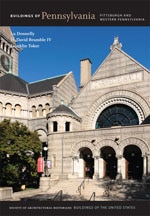
This elegant small stone church was intended to be part of the village of Cornplanter planned by the grandson of the area's original surveyor and owner, Revolutionary War soldier General William Irvine. Irvine's grandson, Dr. William Armstrong Irvine was raised in Philadelphia and attended the University of Pennsylvania's medical school (class of 1824), but he spent summers on the family's land in Warren County. He never practiced medicine, though, and in 1838, he and his wife moved permanently to the Warren County farm and into the Greek Revival house his father Callender Irvine built in 1822 (demolished). William A. was influential in building a turnpike from Warren to Franklin and encouraged the rail line that would carry oil and other goods through his property. The village of Dr. William A. Irvine's dreams, Cornplanter, was to include a stone hotel, school, store, and a bridge across the Allegheny River. Much of it was built, but very soon afterward, the village fell into disrepair as the family's fortunes waxed and waned. Dr. Irvine spent a lifetime holding on to the family's farmlands, despite crushing debts, missed opportunities, and swindling partners. His wife died in childbirth and had the first funeral in this church and burial in the walled family plot adjacent to the church. The church, a small stone “house in the hollow,” and two tenant farmers' houses remain (WA13), scattered through the valley.
The small church, of random-laid sandstone, has a lunette in the gable end, corner quoins, and returning eaves. The double-sash windows each have twenty panes per sash and are round arched with keystones. Two blind windows flank the double entry doors on the north facade. A history of the family, The Irvine Story (1964) by Nicholas Wainwright, states that neighbor Robert Shortt, originally of Lockerbie, Scotland, who came to nearby Youngsville in 1833, was both mason and designer for the stone buildings on the property and in Irvine.

